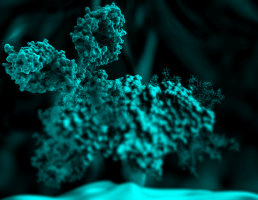
Researchers have developed a novel approach to generate human antibodies rapidly in the laboratory.
This groundbreaking method not only speeds up the production of antibodies to treat many diseases, but it could also be used in the development of new vaccines.
Facundo Batista, from the Francis Crick Institute in London in the United Kingdom, led the team of scientists.
Their research was published in The Journal of Experimental Medicine.
B cells are specialised defender cells that produce antibodies to fight off infections caused by pathogens, which can be bacteria, viruses, or other microorganisms that cause disease.
An individual B cell recognises a particular pathogen-derived antigen, which is a substance that induces an immune response in the body.
Upon recognising the antigen, the B cells quickly multiply, or proliferate, and develop into plasma cells that secrete vast amounts of antibody that bind to the antigen to fight the infection.
Treating B cells with coated nanoparticles
Previously, scientists have tried to replicate this "infection fending off" process in a laboratory by producing specific antibodies from B cells isolated from patient blood samples.
B cells need two signals to begin proliferation and develop into plasma cells.
Encountering and recognising a specific antigen provides the first signal, and short DNA fragments called CpG oligonucleotides provide the second.
CpG oligonucleotides trigger proliferation by activating a protein inside B cells known as TLR9.
Experiments have shown that when patient-derived B cells are treated with CpG oligonucleotides, it is not just the B cells that are capable of secreting a particular antibody that are stimulated; the CpG oligonucleotides stimulate every B cell in the sample.
In the new research, Batista and colleagues discovered a technique in the laboratory to overcome this problem.
They managed to produce specific human antibodies by taking the patient-derived B cells and treating them with minuscule nanoparticles coated with the appropriate antigen and CpG oligonucleotides.
The team's new method is successful due to the CpG oligonucleotides only being internalised into B cells that recognise the particular antigen.
Therefore, these are the only B cells that have their TLR9 activated to start proliferating and developing into antibody-producing plasma cells.
Anti-HIV antibodies from HIV-free patients
Batista and collaborators have demonstrated that their procedure works by using bacterial and viral antigens, such as tetanus toxoid and proteins from several influenza A strains.
The researchers were able to produce specific antibodies over the course of just a few days, and some of the generated anti-influenza antibodies were able to detect multiple virus strains and neutralise their ability to infect cells.
Furthermore, the technique does not rely on the donor having been exposed to antigens through infections or vaccinations.
The investigators demonstrated this by generating anti-HIV antibodies from B cells taken from people who do not have HIV.
The new approach may help researchers to rapidly produce therapeutic antibodies to treat infectious diseases and potentially other conditions, including cancer.
"Specifically, it should allow the production of these antibodies within a shorter time frame in vitro and without the need for vaccination or blood/serum donation from recently infected or vaccinated individuals." said Facundo Batista.
"In addition, our method offers the potential to accelerate the development of new vaccines by allowing the efficient evaluation of candidate target antigens," he concludes.
Source: Francis Crick Institute